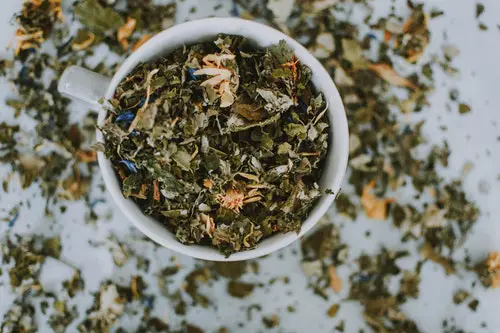
Tea has a couple of psychoactive components like caffeine and l-theanine. However, when consumed in controlled doses, the overall psychotropic effect of tea isn’t that noticeable.
Thanks to the internet, my clients approach me with increasingly unusual questions. And one of these has been, “is tea psychoactive?” Believe it or not, this is something that was actually covered when I was getting my degree. This is because drinks like tea and coffee are heavily consumed by the public and dieticians need to know some of the signs of excess consumption.
In the following post I will be covering what psychoactive actually means. I will also go into detail about the psychotropic components of tea. Finally, I will be giving you a closer look at the impact of tea on your brain.
Let’s begin!

Contents
Before going any further, I want to clarify terms like “psychoactive” and “psychoactive drugs”. This is because most people have a misconception about them. Since they are central to the topic at hand, I want to make sure that you have a proper understanding of terms.
Now, what does psychoactive actually mean?
It is a word that is used to describe any substance that has an impact on the brain and the nervous system in a way that can change someone’s mood. A psychotropic drug or substance can also alter someone’s perceptions and state of consciousness.
If an individual consumes enough of a psychoactive substance, they may achieve a state of intoxication. In many instances, overconsumption of such a substance can cause health risks.
There are a number of natural sources of psychoactive substances. And, contrary to popular belief, not all psychoactive drugs are illegal. However, the legal substances tend to have less of an impact on your mood or perceptions, particularly in smaller doses.
Now, let’s get down to business – is tea considered psychoactive. Well, here’s the thing – tea contains caffeine. And, although you may not know it, caffeine is the most widely consumed (and legal) psychoactive drug.
Another psychoactive component of tea is l-theanine, it is found in higher doses in green tea. Unlike caffeine, though, this substance is considered to be an anxiolytic, which means that it can help to relieve stress and anxiety. In general, it can work to reduce psychological stress.
All of this proves that tea has psychoactive elements. However, the impact is often so small that it can be difficult to classify it as a psychotropic drug. Nevertheless, if it is consumed in large enough quantities over a shorter period of time, then there is potential for it to be considered as such.

As tea has psychotropic components, it can absolutely alter your mood. The caffeine in the tea can help you to feel more alert, improve your concentration, and even provide you with more energy. Too much caffeine, though, can cause you to feel wired and even irritable.
As mentioned, the l-theanine in the tea is linked to feeling of calmness and may improve your mood in general. Tea, particularly green tea, contains an antioxidant that is known EGCG. While it isn’t a psychoactive substance, it is known for its ability to boost your mood as well as your attention and concentration levels.
Overall, though, tea may be linked to a better state of mind. For instance, people in Korea who habitually drank green tea were 21 percent less likely to develop depression over their lifetime. This was compared to non-tea drinkers.
To truly appreciate the psychoactive role of tea, though, you have to have a better understanding of the impact on your brain. Let’s take a closer look…
First, let’s take a look at what caffeine does to your brain. Caffeine is able to mimic adenosine, a neuromodulator, and bypass the receptors without activating them.
In doing so, caffeine blocks the function of adenosine. The result is the release of dopamine and glutamate. Through another process, serotonin and adrenaline is also released. This is what causes you to feel fired up once you have had enough caffeine from your tea.
There is another long-term impact as well. Caffeine sparks brain entropy which works to improve the processing capabilities of your mind. In addition to helping with cognitive performance, reasoning, and verbal memory, there is evidence that caffeine can reduce cognitive decline.
Now let’s move onto l-theanine.
One of the way that l-theanine impacts the brain is via alpha waves. In particular, it increases the frequency in the alpha band waves. This causes your mind to feel relaxed, without descending into drowsiness.
At the same time, alpha waves are also known to boost mental alertness and arousal, working to improve overall concentration. Therefore, it stands to reason that l-theanine can improve certain elements of cognition as well.
Another way that l-theanine can boost cognition is by increasing the levels of serotonin, dopamine, and GABA in the brain. Interestingly enough, there is also evidence that it could as a neuroprotective agent as well. Thus, with regular consumption, it may be able to slow down cognitive decline.
Caffeine and l-theanine don’t just function independent of one another, though. They can actually work together to have a positive impact on your brain. They work to reduce mental caffeine while improving reaction time, memory, and verbal capabilities.
Furthermore, side effects typically associated with caffeine such as headaches were decreased.

Do you feel like you can’t make it through the day without a specific number of cups of tea? If so, you can blame the caffeine content in your brew.
Remember how caffeine could mimic adenosine and block the associated receptors? Well, if you consume tea regularly, this will happen more often. To compensate for this effect, your brain may begin to produce more adenosine receptors.
Therefore, you are going to need to consume more caffeine – tea – to get the same buzz as you did before. It also means that if you were to stop drinking tea or to reduce your intake, you could potentially begin to experience withdrawal symptoms.
These could be something like:
These may begin to appear as soon as twelve to twenty four hours after you have given up tea and can go on for as long as nine days. After this point, though, the symptoms should decrease.
Interestingly enough, it can take as few as drinking two or three cups of tea a day to develop a reliance on the substance. Due to this, it is a good idea to limit your consumption to about a cup a day to remain on the safe side.
As you can see, tea can have a psychoactive effect, but you may not be able to call it a full-on psychoactive drug. Take enough of it, though, and it will certainly have an impact on your mood. Furthermore, there are also negative side effects without consuming too much as well. Thus, moderation is key.
Did you enjoy this post? If so, make sure to check out our Pinterest page. We have tons of other information on how tea can impact your health, cognitive function, and more!
